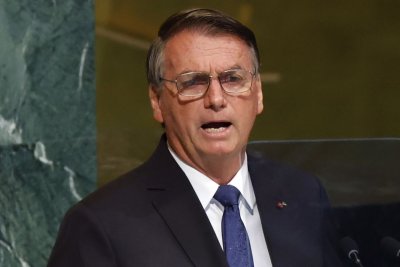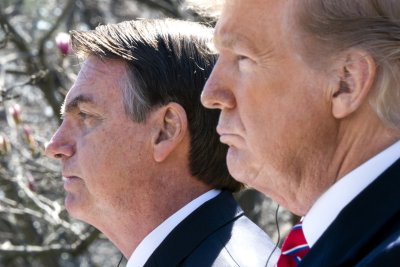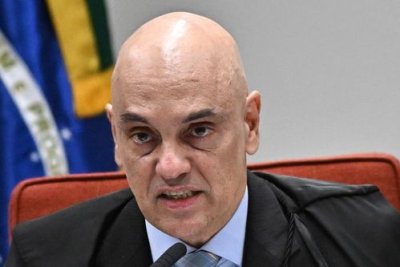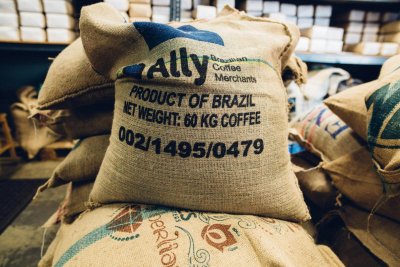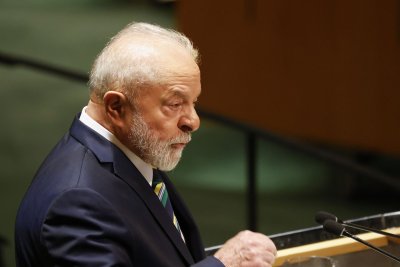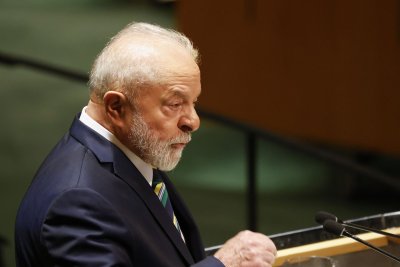July 9 (UPI) — President Donald Trump on Wednesday informed seven more nations about new tariffs, singling out Brazil with a 50% duty because of what he called the “disgrace” of how former President Jair Bolsonaro has been treated and an “unfair trade relationship.”
Other nations told about rates effective Aug. 1 were the Philippines 20%, Moldova 25% and Brunei 25%, and Algeria, Libya and Iraq at 30% on goods they ship to the United States.
Trump so far has sent letters to 21 nations with seven on Monday. They all had standard language in the two-page letters, except for the one to Brazil.
Trump told current President Luiz Inacio Lula da Silva in a letter posted on Truth Social that “the way Brazil has treated former President Bolsonaro, a Highly Respected Leader throughout the World during his term, including by the United States, is an international disgrace. The trial should not be taking place. It is a Witch Hunt that should end IMMEDIATELY.”
Bolsonaro, who faces charges that he plotted to overturn his 2022 election loss against Lula, has been referred to as the “Trump of the tropics.”
Trump also noted “Brazil’s insidious attacks on Free Elections, and the Fundamental Free Speech Rights of Americans.”
And he said the United States also is launching an investigation into potential unfair trade practices by Brazil, Trump wrote in the letter.
He said the South American nation’s trade policies have caused “unsustainable Trade Deficits against the United States,” which threaten the U.S. economy and national security.
On April 2 on “Liberation Day,” Brazil was among most U.S. trading partners imposed a 10% baseline tariff. Brazil was not among the nations threatened with harsher reciprocal tariffs but on Monday, Trump threatened an additional 10% tariffs on BRICS nations, including Brazil, Russia, India, China, South Africa. The other BRICS nations are Egypt, Ethiopia, Indonesia, Iran, Saudi Arabia and United Arab Emirates
Tariffs has not sent letters to the BRICS nations except a 30% one for South Africa and 32% for Indonesia.
The U.S. has a goods trade surplus with Brazil of $7.4 billion in 2024, according to the Office of the U.S. Trade Representative.
The United States’ big imports from Brazil include crude petroleum and refined petroleum products, iron and steel, machinery and agricultural products, including fruit and vegetable juices, and meats.
“Please note that the 50% number is far less than what is needed to have the Level Playing Field we must have with your country,” Trump wrote. “And it is necessary to rectify the grave injustices of the current regime. As you are aware, there will be no Tariff if Brazil, or companies within your country, decide to build of manufacture within the United States, and we will do everything possible to get approvals quickly, professionally, and routinely, in other words, in a matter of weeks.”
On Tuesday, he signed an executive order that officially pushed back the implementation date from July 9 to Aug. 1. He said there will be no more extensions. Trump originally intended the harder penalties to take effect earlier but on April 9 he paused it 90 days.
The new tarriffs, except for Brazil, range from 20% to 40% with the latter imposed on Laos and Myanmar.
Among major trading partners, Japan and Korea were slapped with 25% duties.
The letters state that the 25% tariffs are separate from sector-specific duties on key product categories.
On Tuesday, Trump announced a 50% tariff on imported copper after 50% imposed in June on steel and aluminum.
“These Tariffs may be modified, upward or downward, depending on our relationship with your Country,” Trump wrote in the letters. “You will never be disappointed with the United States of America.”
Trump has yet to impose new tariffs on the 27-member European Union, but has said negotiations were not going well.
Trump also warned that the rates could be higher if they impose retaliatory duties.
In the latters Trump said there will be no tariff in the nation or the company “decide to build or manufacture product within the United States and, in fact, we will do everything possible to get approvals quickly, professionally, and routinely.”
U.S. stock indexes rose Wednesday, with the Dow Jones Industrial Average going up 0.49%, Standard and Poor’s 500 rising 0.61% and tech-heavy Nasdaq Composite increasing 0.95%.
Two index are just off record highs Thursday — S&P 16 points and Nasdaq 13 points. DJIA is several hundred points off a record on Dec. 4.
Stock indices in the U.S on Monday each dropped less than 1% after the letters were made public.
